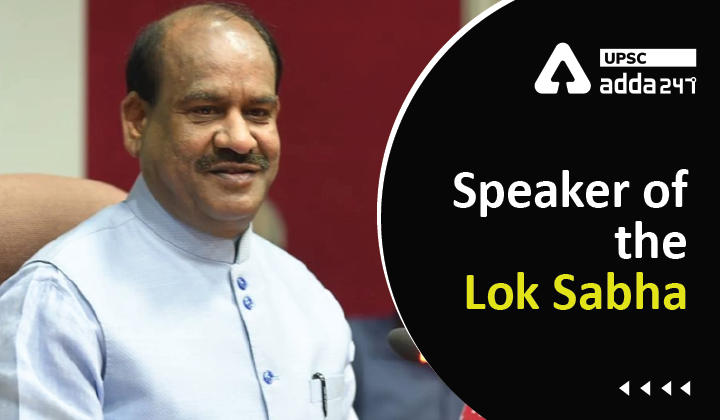Table of Contents
Speaker of the Lok Sabha- Relevance for UPSC Exam
- GS Paper 2: Indian Constitution- Parliament and State Legislatures– structure, functioning, the conduct of business, powers & privileges and issues arising out of these.

Speaker of the Lok Sabha
- The Speaker of the Lok Sabha is the constitutional and ceremonial head of the House who is primarily responsible for managing the functions of the Lok Sabha.
- Presiding Officer: Speaker of the Lok Sabha is the Presiding Officer of the Lok Sabha and in his/her absence Deputy Speaker of Lok Sabha acts as the presiding officer of the House.
- Constitutional Provision: Article 93 of the Indian Constitution deals with both the office of Speaker and the Deputy Speaker of Lok Sabha.
Historical Background of Office of Speaker
- Government of India Act of 1919 (Montague-Chelmsford Reforms): Under its provisions, the office of speaker and deputy speaker was created in 1921.
- However, back then, the office of speaker and deputy speaker were called the President and Deputy President respectively.
- Government of India Act of 1935: It changed the nomenclatures of President and Deputy President to the Speaker and Deputy Speaker respectively.
- However, the old nomenclature continued till 1947.
Term of Office and Removal of the Vice-President of India
Election to the Office of Speaker of the Lok Sabha
- Qualification: As per the Constitution of India, the Speaker should be a member of the House (Lok Sabha).
- Convention: There has been a convention evolved where ruling party nominates its candidate after informal consultations with leaders of other parties and groups in the House.
- This way the elected Speaker of the Lok Sabha enjoys the respect and obedience of all the members of the Lok Sabha.
- Election Procedure: The speaker of the Lok Sabha is elected from all other members by simple majority of members present and voting in the House.
- Normally, the Speaker belongs to the Majority ruling party. However, there are certain cases when the elected Speaker did not belong to the majority ruling party of Lok Sabha
- For example- G. M. C. Balyogi, Manohar Joshi, Somnath Chatterjee.
Terms of the Office of Speaker of the Lok Sabha
- Term of Office: The Speaker holds Office from the date of his/her election till immediately before the first meeting of the next Lok Sabha.
- Even after dissolution of the Lok Sabha, the Speaker does not vacate his office and continues till the newly-elected Lok Sabha meets.
- This means hies/her term extends beyond the terms of a Lok Sabha.
- Eligible for Re-election: The speaker of Lok Sabha is eligible for re-election as well.
FAQs
- Who is the Speaker of Lok Sabha?
Ans: The office of Speaker of Lok Sabha is the constitutional and ceremonial head of the House who is primarily responsible for managing the functions of the Lok Sabha.
- Which Constitutional Article deals with the Office of Speaker of Lok Sabha?
Ans: Article 93 of the Indian Constitution deals with both the office of Speaker and the Deputy Speaker of Lok Sabha.
- Who elects the Speaker of the Lok Sabha in India?
Ans: The speaker of the Lok Sabha is elected from all other members by simple majority of members present and voting in the House.




 TSPSC Group 1 Question Paper 2024, Downl...
TSPSC Group 1 Question Paper 2024, Downl...
 TSPSC Group 1 Answer key 2024 Out, Downl...
TSPSC Group 1 Answer key 2024 Out, Downl...
 UPSC Prelims 2024 Question Paper, Downlo...
UPSC Prelims 2024 Question Paper, Downlo...




